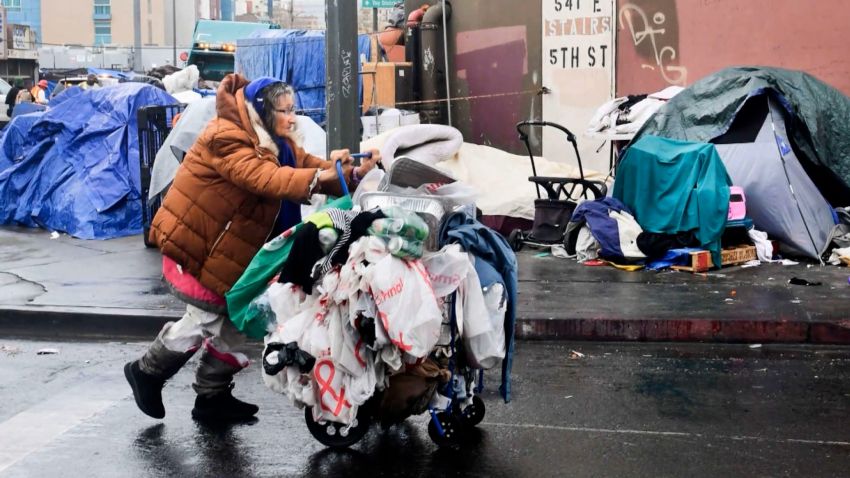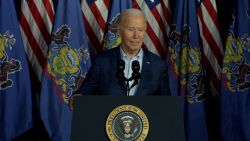A version of this story appeared in CNN’s What Matters newsletter. To get it in your inbox, sign up for free here.
New York City Mayor Eric Adams gave the city’s first responders, including its police force, a controversial new task this week – to enforce a state law that allows them to involuntarily commit people experiencing a mental health crisis.
From CNN’s report by Mark Morales:
Adams said it was a myth that first responders can only involuntarily commit those who displayed an “overt act” that they may be suicidal, violent or a danger to others. Instead, he said the law allowed first responders to involuntarily commit those who cannot meet their own “basic human needs” – a lower bar.
The police department is still formulating a plan and Adams, a former cop, said officers will get additional training and real-time support from mental health professionals.
The move follows a raft of violence in New York City and also increasingly visible homeless encampments in New York and cities around the country.
Adams framed the policy as a way to help people who need it.
“It is not acceptable for us to see someone who clearly needs help and walk past,” he said.
Advocates for the homeless oppose this. “The city really needs to approach this more from a health and housing lens, rather than focusing on involuntary removals and policing,” Jacquelyn Simone from the Coalition for the Homeless told CNN’s Brynn Gingras for her report that aired this week on “AC360°.”
Mental health professionals are questioning it. “We are defaulting to an extreme that takes away basic human rights,” Matt Kudish, CEO of the New York chapter of the National Alliance on Mental Illness, said in a statement after Adams’ announcement.
Kudish said New York should do more to help people before they need intervention: “The City has the power to provide onsite treatment, as well as treatment in homeless shelters or supported housing, but has chosen not to.”
Police are worried it puts them in a precarious position. “As soon as they want to resist, now where does the liability form – on the uniformed officer,” retired NYPD detective Andrew Bershad told Gingras.
I talked to Ryan McBain, a policy researcher at the RAND Corporation who studies how government policies can reach vulnerable populations, including those experiencing both mental illness and housing insecurity.
‘Fuel for escalation’
McBain argued Adams’ move is “well-intentioned but misguided,” first of all because police interactions with people experiencing serious mental health issues is “fuel for escalation.”
“It’s something like 1 in 4 people who are shot by a police officer are people with significant mental health issues,” McBain said. When I looked to confirm that 25% figure, I found this in a 2015 Washington Post investigation.
“If you stop and think about it, it makes sense, right? People who are disoriented or having atypical thoughts, they’re not in a position oftentimes to comply collaboratively with a police officer,” he said. “And given the fact that police officers are carrying weapons, you have sort of a recipe for bad outcomes.”
There’s evidence, he said, that actually deploying trained mental health professionals alongside police officers would be more effective. In New York, first responders will get additional training and have access to a hotline with mental health professionals.
There probably aren’t enough psychiatric beds
Another issue is more systemic and has to do with how the US deals with chronic and serious mental illness, from a system of large institutional asylums that were shuttered in the ’60s and ‘70s to a flawed system focused on private insurance and community-based mental health centers.
Currently, there aren’t enough beds for psychiatric patients.
“We don’t need giant asylums where the conditions are inappropriate, but we do need larger facilities with more beds that can provide the type of care that the patients really need when they have more serious mental health issues,” McBain said.
More holistic solutions
More permanent supportive housing is required for people who experience both mental health issues and homelessness. But that kind of solution – the public providing housing alternatives for people who cannot provide for themselves – can be expensive and politically difficult.
RELATED: How one Minnesota county has been rapidly housing the homeless since the pandemic
It’s a sentiment echoed by Dennis Culhane, a professor of social policy at the University of Pennsylvania, who appeared on “AC360°” on Thursday. “That is the fundamental problem here,” Culhane said. “You cannot actively and effectively treat people without having them in a place where they can take care of themselves.”
McBain said that in the US health system, which is geared around insurance paying for services, mental health is not treated on par with physical health.
“In the best of all possible worlds, you’d have a continuum of care for addressing people’s mental health needs,” he said.
“And that continuum would begin with high-quality outpatient services that private insurers pay for at parity with physical health conditions. … I think until you see the system try to address these issues in a holistic way, these issues are going to continue to persist,” he said, arguing, “Mayor Adams is proposing putting a Band-Aid on something for which you really need sutures.”

















